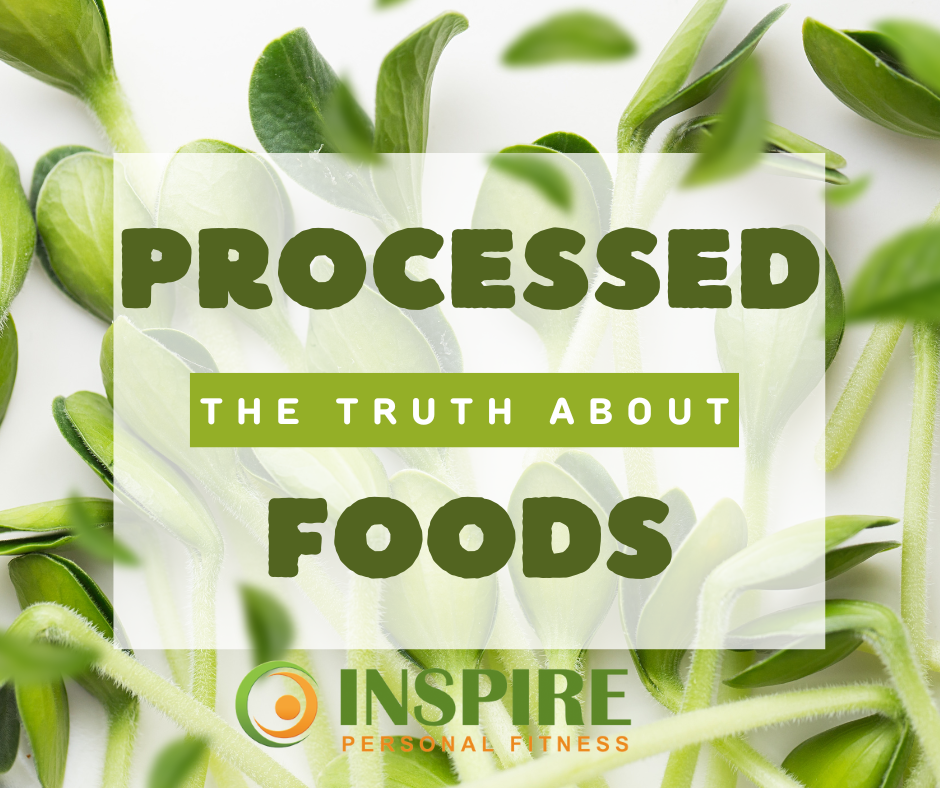Hello everyone!
Carly here. I have (what I think is) an interesting topic to chat about today. You may be aware that I am a Certified Nutrition Coach and Weight Loss Specialist – I work with clients to help them make better food choices and overall healthy habits to support their health and weight goals. I was creating a list of meal ideas for a client over the weekend, and I noticed a few of the options were or included some “processed” foods. As a nutrition coach, it is my responsibility to encourage a mostly whole foods-based diet, so I started to second guess myself. Was I providing the best possible options??
….I think so.
I’d like to spend some time discussing the differences between whole foods and processed foods, why it is not a “health crime” to include some processed foods in your diet, and why the recommendations I made will likely ultimately benefit my client.
So first off, when comparing whole foods to processed foods, we are looking at a spectrum:
1 – Whole Foods – the form they are found in nature, or very close to it.
2 – Minimally Processed – have been slightly altered without substantially changing the nutritional content.
3 – Moderately Processed – have been altered more significantly, often reducing nutritional value by removing or adding components.
4 – Highly Processed – barely resemble their whole-food origins, and have minimal nutritional value
So of course, we encourage eating mostly whole foods for 3 main reasons:
1 – Meet Your Nutritional Needs: the more processed our foods, the less fiber and micronutrients we are able to use from the original foods, and the more additives are consumed – such as unhealthy fats, sodium, preservatives, sugar, refined starch, and fillers.
2 – Better for Your Health: the truth is, we are healthier when we eat more whole foods and become at a higher risk of depression, heart disease, type 2 diabetes, cancer when we consume more highly processed foods.
3 – Weight & Appetite Regulation: minimally processed foods take longer to eat, contain more satiety boosting ingredients such as fiber and protein, and fill you up on fewer calories.
So does this mean you should stop eating all processed foods? No.
1 – Some Processed Foods are Good for You: Protein powders have a high protein density and are extremely cheap per serving, store bought hummus is a great source of fiber, and tofu is high in calcium, to name a few.
2 – Processed Food Tastes Good: When consumed in moderation, processed foods can help boost mood, and help you enjoy your meal more. (HELLO, CHEESE!!)
3 – Processed Food is More Convenient: We are all busy. We may not always have our own time to make our own salad dressings and sauces, or even a whole meal. Processed options help reduce stress and time in the kitchen so we can get on with our lives.
4 – Choose Consistency & Progress Over Perfection: Again, food quality is on a spectrum. You want to consistently make better, more healthy options, but understand that perfection is not possible or sustainable.
So, when thinking back to the recommendations I made to my client:
1 – I know that some of the more processed recommendations I offered had a high nutritional value – meaning there was a specific reason those foods were added in (usually protein).
2 – I also know that the ones I added in for flavor/pleasure were used in moderation, and NOT in a way that would encourage overeating.
3 – I added in a few options that were nutritionally beneficial that were great on-the-go options or didn’t take a lot of effort to make.
4 – I know that I am helping my client find healthier, more balanced ways of eating, that aren’t too stressful to keep up with.
I think that releasing food guilt from our lives is an incredibly important aspect of having a healthy relationship with food, and so there is absolutely nothing wrong with intentionally adding processed foods into your diet, within moderation, of course.
Next week I am going to chat about some examples of what the food processing “spectrum” looks like, as well as a few suggestions on how to choose better, easier, and more satisfying options.
If you would like to sign up for nutrition coaching or would like more information about how it might benefit you, please email me at carlyleasurefitness@gmail.com or text us at (828) 845-4953.
Talk soon,
Carly Leasure, CPT, CNC, WLS


